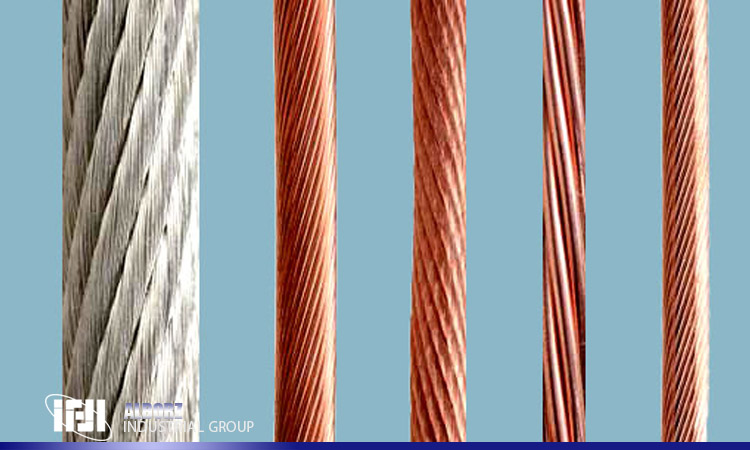Most important metals present in electrical wires:
Copper: Copper is one of the most widely used metals in electrical wires. Due to its excellent electrical conductivity, flexibility, and resistance to corrosion and oxidation in various environmental conditions, copper is the most suitable option for manufacturing electrical wires.
Aluminum: Aluminum, with its lighter weight and ability to conduct electric current, has lower mechanical resistance. Aluminum is used as a substitute for copper in some electrical wires, especially in long-term transmission lines.
Properties and applications of metals in electrical wires:
Copper: Copper, as a conductor with unique properties such as high conductivity, flexibility, and stability in environmental conditions, is used in various applications, including power distribution and transmission cables, electrical and electronic components, and household appliances. It is extensively used in various cable trays.
Aluminum: Aluminum, due to its lighter weight, is considered a more suitable alternative to copper for long-term power transmission lines. It is also used in industries such as automotive manufacturing, energy efficiency, and various industrial applications.
Importance of choosing the right metal for electrical wires:
The selection of the appropriate metal for making electrical wires is crucial. The metal’s characteristics have a significant impact on performance, energy transfer, heat resistance, and environmental sustainability. Choosing the wrong metal can lead to energy losses, reduced efficiency, and even safety hazards.

Recycling metals and producing electrical wires:
In recent years, research in the field of metals used in electrical wires has led to significant advancements. Particularly, developments in improved properties and the development of new metals have been achieved. Efforts have been made to enhance electrical conductivity, reduce energy losses, and increase resistance to environmental conditions, for example, through the use of nanostructured metals.
However, challenges exist in securing recycled and sustainable metals. Due to the growing production of electrical wires and the need for metals, ensuring a stable supply of recycled metals is of great importance for reducing environmental and economic impacts.
New technologies in the field of electrical wires:
Innovations in the technology of metals used in electrical wires are currently under development. For instance, nanostructured metals, produced in the form of nanoparticles, possess unique properties that can significantly improve the performance and functionality of electrical wires.
In the future, various innovations in the field of metals used in electrical wires are expected. From the development of metals with improved properties to the use of more advanced technologies for production, shaping, and connecting metals, significant advancements in this field are anticipated.
Recommendations for optimal use of electrical wires:
For optimal use of metals in electrical wires and to enhance the quality of electrical systems, the following recommendations can be considered:
Continuous research and development: Ongoing research in the field of metals, especially novel and recycled metals, can lead to the development of materials with better properties and environmentally friendly characteristics. Use of advanced technologies: To improve production, connection, and transmission processes, the use of advanced technologies such as nanotechnology, protective coatings, and innovative methods is recommended. Utilization of recycled metals: Encouraging the use of recycled metals to reduce the need for mining and energy consumption, as well as to minimize environmental impact. Increasing public awareness: Public awareness regarding the importance of optimal use of metals in electrical wires and its environmental effects can promote more sustainable utilization of metal resources. Life cycle analysis consideration: In the selection of metals and materials, life cycle analysis from production to disposal is essential to reduce environmental impacts and enhance overall efficiency.

In conclusion, metals in electrical wires play a crucial role in their performance, functionality, and sustainability. The choice of the right metal, considering various needs and conditions, ensures the efficiency and stability of electrical wires. Continuous technological advancements and innovations are expected to contribute to the development of more advanced and sustainable electrical systems.







